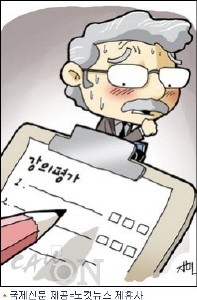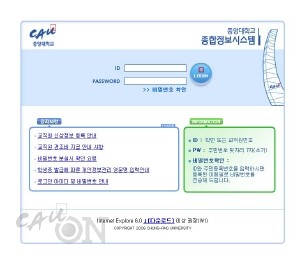Su-mi: In-su! Did you check your academic records?
In-su: Not yet. I cannot check my grade yet, because I did not finish my lecture evaluations.
Su-mi: Me, too. It is too formal a process.
In-su: Also, I have been afraid that my professor will read my evaluation, so I am reluctant to do the evaluations.

The lecture evaluation system rates lectures. Universities introduced the Lecture Evaluation system since 1993, when Hanshin University started the practice. But professors and students are skeptical about the systems ability to truly reflect improvements in lecture conditions.
On the evaluation, there are twenty items, but most of the questions are about formalities and ambiguous. They are impertinent lecture evaluation questions. Many universities are not changing these questions for the development of lecture that are in the early stages of introduction. In truth senior students at Chung-Ang University, said that despite the lecture process and education conditions change every year, the questions on the lecture evaluation did not reflected this situation.
The lecture evaluation is impossible to revitalize as a valuable feedback system. The current university system does not introduce interim evaluations in lecture the evaluation system. Therefore, students deliver their opinion about a class as good quality or not after the last lecture. You might say that ‘It is too late to lock the stable, after the horse has been stolen.’ Oxford University has an alternate this problem. They submit a lecture evaluation document regardless of time or period. Professors then make an effort to reflection that which can help students accept a class of good quality.
Another problem is that we cannot grasp the medium- and long-term effect. Education activity is important in the short-term effect, of course, but the medium- and long-term effect is also very important. However, most lecture evaluation systems in force estimate that they have grounds for believing the answers of the students attending a lecture. This can grasp the short-term effect, but it is structurally impossible to grasp the medium- and long-tem effects.
Many students want to make public the lecture evaluation result. The universities are in control of lecture evaluation results, and notify the professor. The students raise their voice demanding results from the university on that account. They think that undisclosed lecture evaluation results are an infringement of the student’s ‘rights to know’, and brings about a dearth of information about the lecture. Harvard University for example makes a ‘Yellow Book’, which includes lecture evaluation results, and furnishes information for reference materials of the application of courses.
Yonsei University students that have a grievance against the university, now have an operation called ‘Lecture evaluation opening effort’. Students think the evaluations are critical, but that the university excludes students in process and result, and assert that students have a right to obtain information without difficulty. Yonsei students therefore demanded the following. 1) Students should have an opening of lecture evaluation results. 2) Students have access to check lecture evaluations. 3) Give authorization to amend lecture evaluation questions. However, Yonsei University claims that if lecture evaluation results were unveiled, there will be an incorrect understanding about the results and there will be focus on popularity rather then content. This may cause professors to become demoralized and go downhill.

University students are responsible for the problems of the lecture evaluation system. They do not give answers sincerely. They are busy trying to check academic records. Some students even hand-in lecture evaluation document without reading the question. Students practically relinquish their rights in this situation.
The Lecture Evaluation System has several problems, so how can we fix the problem?
First, the University and students have to indicate a specific objective and standard of lecture evaluation. In the ‘Yondo’ site, students put on record about the lecture evaluation. They organize questions with students as the central figures. In addition, an operator corrects questions following the student’s advice every semester. Judging from this, the ‘Yondo’ site could indicate specific objectives and standards.
In addition, the ‘Best Teaching Professor Prize’ will promote and help to keep professors in high spirits. It will minimize the oppositions of professors through a ‘positive method’ rather than a ‘negative method’. The professors will think that the selection of ‘Best Teaching Professor Prize’ is an honorable event. For example, Taegu University adopted a ‘Best Teaching System’ in 2004. The opening of the lecture evaluation result had a problem with professors at first, but it considered the merits by feeling sympathy because of the fairness of evaluation day-by-day. Chung-Ang University also gives preference for making good marks at lecture evaluation. They have their salary raised, and receive a prize.
Third, there is an introduction method for the lecture evaluation system aimed at graduate-to-be and college graduates. Graduate-to-be and college graduates select the five best classes and three worst classes among classes they are attending. This will go far towards forecasting and managing the medium- and long-term effects.
Above all things, it is important that the University have good Public Relations (PR) and educate students about the importance of sincerely answering the questions.
In advanced university, the Lecture Evaluation System is important to the process of raising the learning quality and professionalism of both professors and students. Students maintain their right to take a class in a good environment, and professors can feel the student’s pulse. When we combine student’s awareness with professor’s thoughts with composure, we have good results. Internal University and In-ha University were evaluated through 10 items such as special features of the class and the number of students present in the lecture class. Korea University was divided into six parts by lecture banishment.

